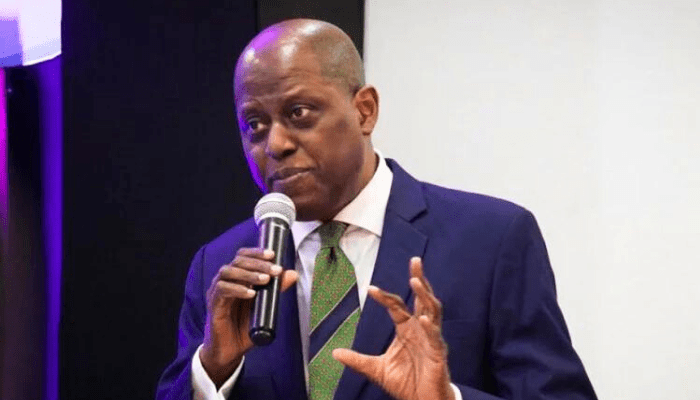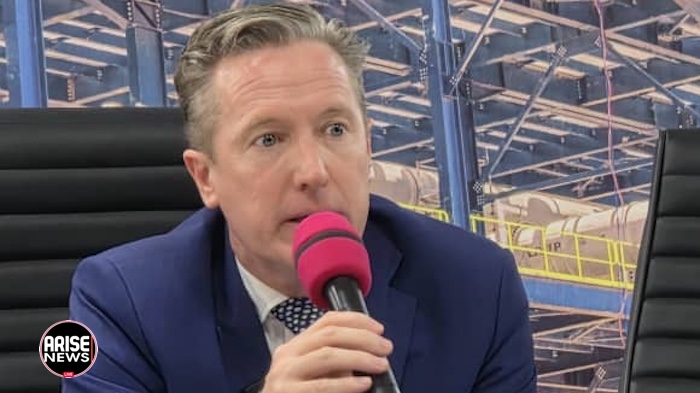
The Governor of the Central Bank of Nigeria (CBN), Olayemi Cardoso, has reassured investors of Nigeria’s improving macroeconomic stability, just as he revealed that the country’s foreign exchange (FX) market turnover has so far risen to $8.6 billion monthly in 2025.
Additionally, Cardoso, who spoke during an Investors’ Forum in Washington D.C., on the sidelines of the ongoing IMF/World Bank Annual Meetings, pointed out that Nigeria’s gross external reserves have climbed to $43.4 billion, enough to cover 11 months of imports.
This comes as the Chairman of Heirs Holdings and United Bank for Africa (UBA), Tony Elumelu, on Wednesday called for the mobilisation of $4 trillion in domestic capital across Africa to drive investments in digital infrastructure, energy, and other critical sectors, calling for coordinated action to democratise prosperity on the continent.
Speaking on “Boosting Productivity Growth in the Digital Age” at the ongoing IMF/World Bank Annual Meetings, Elumelu highlighted the untapped potential of Africa’s domestic capital.
Equally, the United Bank for Africa (UBA) Plc, will today reinforce its role in shaping the continent’s financial ecosystem with the launch of its landmark whitepaper on financial infrastructure. .
Speaking further, Cardoso, noted that the FX market premium, which had soared to 52 per cent in 2022, has now fallen to less than three per cent, reflecting the success of ongoing monetary and fiscal reforms.
At the interactive session attended by global investors, investment bankers, and members of Nigeria’s economic management team, the CBN Governor emphasised that the country’s economic focus remains on strengthening fundamentals, advancing reforms, and unlocking sustainable investment opportunities.
Cardoso said. “The Central Bank and the Ministry of Finance have been working hand in hand to ensure alignment, stability, and clarity for investors. Nigeria’s focus remains clear strengthening our fundamentals, advancing reforms, and unlocking opportunities for sustainable investment and growth. We are encouraged by the progress made so far and remain confident that ongoing reforms are laying a stronger foundation for a more resilient economy.”
Following the Governor’s remarks, Deputy Governor, Economic Policy, CBN, Mohammed Sadi Abdullahi, provided a detailed overview of Nigeria’s improved external position, monetary policy measures, and financial market reforms.
Abdullahi noted that Nigeria’s current account surplus for 2024 stood at over $17 billion and was projected to exceed $20 billion in 2025, supported by higher oil output, diversification into non-oil commodities, renewed manufacturing activity, reduced petroleum imports, and strong remittance flows.
“Over the last two years, we’ve really focused a lot on improving FX flows into the economy, and we’ve seen a significant jump. Average net flows between January 2023 to July 2025 have doubled.
“FX supply at the official window has significantly improved and been driven by order-based quotation, a lot of reforms around remittances and all the other issues that I mentioned, and the clearance of backlogs and all outstanding obligations.
“There’s been a significant increase in the average monthly turnover to $8.6 billion monthly in 2025 versus an average of $5.5 billion and much less in the year before. Today, CBN stands as a net supplier by less than about a percentage of the market turnover. We’re actually a net buyer in the market.
He added: “We have, over the last two years as well, been rebuilding external buffers to provide resiliency to shocks. Our foreign exchange reserves, our gross reserves, are at a five-year high of $43.4 billion as of 10th October, enough import cover for 11 months. “We have continued to also deliberately improve the quality and quantum of our net FX reserves. Between last year and this year, we have released almost $13 billion back to local and international banks in a way that is allowing for organic growth of our own reserves.”
He added: “In terms of the balance of payments, we are doing significantly better. The current account surplus for 2024 was over $17 billion, and we’ve continued to see for this year improvements in our current account, our financial accounts, and we do hope to close the year as well with even more impressive figure.
“Organisational remittances have also improved. Disaster payments and the current account balance are projected to grow to over $20 billion, supported by high oil output, diversification into non-oil commodities, renewed manufacturing, reduced petroleum imports, and strong remittance flows.”
In her presentation, Special Adviser to the President on Finance & the Economy, Sanyade Okoli, highlighted the government’s multi-pronged strategy to strengthen fiscal, monetary, and institutional frameworks.
“The focus now is on inclusive growth that comes with high-quality jobs. Nigeria is a huge and youthful nation, and we need to ensure that we are rapidly generating the kind of jobs required to keep our youth productively engaged.
“We are building blocks in four areas: continued pursuit of macroeconomic stability, improving governance and regulatory frameworks to attract investment, investing in infrastructure, and improving access to capital both debt and equity to stimulate the economy,” she added.
Speaking on ongoing talks with JP Morgan for Nigeria’s re-entry into the Government Bond Index for Emerging Markets (GBI-EM), Director-General of the Debt Management Office (DMO), Patience Oniha, said: “JP Morgan has given us the requirements, and we are working towards meeting them. As for timing, it cannot be definite, but we are working closely with them to ensure we get back.”
Meanwhile, Elumelu, who spoke during a panel session that included the Managing Director of the IMF, Kristalina Georgieva, highlighted the untapped potential in Africa’s domestic capital.
He stressed that harnessing these resources could reduce pressure on government finances while enabling transformative investments.
“It is estimated that over $4 trillion in domestic capital exists across Africa. If we can mobilise this effectively, we will not strain governments’ fiscal capacity.
“The challenge lies in working together to channel these resources responsibly, establish trust, and ensure accountability,” Elumelu said.
Highlighting the role of infrastructure in driving productivity, he added, “If we fix access to electricity, we address key issues such as productivity, youth employment, and engagement, while also enabling the continent to support global economic growth.”
Furthermore, Elumelu also spoke on the continent’s youth, noting that over 60 per cent of Africa’s population was under 30 and eager to contribute to development.
“They are not asking for sympathy or handouts. They want systems that work. For that, everyone, governments, private investors, and development partners must collaborate to create opportunities and unlock productivity.”
He stressed that Africa was at a critical juncture, where “massive and coordinated investment,” was needed to harness the potential of the digital age. While technology and artificial intelligence present unprecedented opportunities, Elumelu warned that structural barriers—including insufficient infrastructure, capital constraints, and electricity deficits—remain hurdles to inclusive growth.
“Productivity today is about people, not just output per worker, but opportunity per person. Africa can leapfrog in sectors like healthcare, agriculture, and energy but only if we address the fundamental barriers first,” he said.
Having supported over 20,000 young entrepreneurs through his foundation, Elumelu emphasised that deliberate investment in digital infrastructure, electricity, and human capital is essential.
“AI and productivity in the 21st century should democratise prosperity, not concentrate it. Inclusion is not automatic; it must be intentional.”
He concluded by urging African governments and private stakeholders to act decisively.
“The mobile money revolution happened because entrepreneurs innovated within constraints. We can do the same with AI—but only if we mobilise capital, fix infrastructure, and work together,” he added.
Meanwhile, UBA will on Thursday in WashingtonDC, reinforce its role in shaping the continent’s financial ecosystem with the launch of its landmark whitepaper.
The whitepaper, titled “Banking on Africa’s Future: Unlocking Capital and Partnerships for Sustainable Growth,” places Africa’s economic agenda at the heart of global financial discussions.
The document presents a comprehensive and actionable framework for unlocking Africa’s vast economic potential, providing analysis of critical growth pillars including trade facilitation, infrastructure development, digital innovation, climate finance, and inclusive growth, while showcasing strategies for leveraging domestic capital alongside strategic global partnerships to access the continent’s $3.4 trillion single market potential under the African Continental Free Trade Area (AfCFTA).
Elumelu, who emphasised the strategic importance of this whitepaper, explained that over the past few years, the bank has become an active leader in conversations and activities that drive tangible investments to the continent.
“UBA is shifting Africa’s development agenda from talk to action. With this whitepaper, we are championing initiatives that convert strategic dialogue into bankable projects and direct investments. Our commitment to execute these plans for the benefit of the continent and its people cannot be overemphasised,” Elumelu said. “We are committed partners in Africa’s development and sustainability and will continue to provide the capital, the platform, and the network needed to transform Africa’s vast potential into economic growth.”
UBA’s Group Managing Director and Chief Executive Officer, Oliver Alawuba, remarked on the white paper’s significance, highlighting the urgent need for private sector leadership.
“This whitepaper is a call to action and a statement of our capability,” Alawuba said. “It underlines our unique position in facilitating the partnerships and capital flows required to finance Africa’s future, providing the blueprint for action. The document delivers critical insights at a defining moment for Africa’s financial infrastructure.”
Again IMF Urge Fiscal Discipline, Stronger Revenue Mobilisation
The Monetary Fund (IMF) has stated that Nigeria’s fiscal outlook was set for gradual improvement, even as it called for fiscal discipline.
This was disclosed in the IMF’s October 2025 Fiscal Monitor launched at the ongoing IMF/World Bank annual meetings in Washington D.C. on Wednesday.
Nigeria’s public debt trajectory was expected to stabilise over the medium term, hovering between 41.1 and 41.4 per cent of GDP from 2027 through 2030. The Fund noted that the figures include overdrafts from the Central Bank of Nigeria (CBN) and liabilities from the Asset Management Corporation of Nigeria (AMCON).
IMF estimates that general government expenditure would rise modestly from 12.5 per cent of GDP in 2025 to 12.8 per cent in 2026, underscoring Nigeria’s effort to maintain a balance between fiscal consolidation and the need to strengthen social protection and capital investment.
At the press briefing on the Fiscal Monitor, Division Chief, Fiscal Affairs Department, IMF, Davide Furceri, while responding to THISDAY’s question on Nigeria’s debt level, noted that Nigeria’s fiscal reforms over the past few years had contributed to a more sustainable trajectory.
He also added that ongoing reforms in tax administration, the reduction of tax expenditures, and the streamlining of the tax code have positioned Nigeria to enhance revenue mobilisation without undermining business competitiveness.
He said: “The structural characteristics in terms of our recommendation for countries, as in Nigeria, and our policies, advice has been both on the on the on the revenue side as well, on the spending side.
“I think on the revenue side, there is a scope to improve revenue through reform of the tax administration, to increase revenue mobility session in a way that doesn’t outgrow, for example, tax reform, and this, actually, Nigeria has done quite a lot in the past years.
“I think, like many of the laws that they’ve passed, they have tried to streamline the tax code,” he added.
He said further: “Tax expenditures have reduced the burden for business and low income also as the client in terms of taxation, these are policies that go in the right directions.
“ On the spending side, there is a scope to, on the one hand, improve the efficiency of the spending itself that we also talk in the chapter about gains can can be achieved when countries improve the efficiency of the spending as well the compositions, but also to increase social spending to address social vulnerability in the country.”
Eromosele Abiodun and Nume Ekeghe



